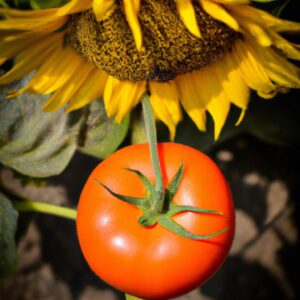What is Sustainable Agriculture?
Sustainable agriculture is an approach to food production that is designed to maintain and improve the land while protecting the environment and providing healthy, nutritious food. It is based on principles of stewardship, biodiversity, and appropriate technology to build a productive and profitable agricultural system that sustains the land for future generations. The goal is to use natural resources such as soil, water, air, and plants in a way that optimizes food production while preserving the planet.
Sustainable agriculture seeks to produce more with less by focusing on healthy soils, efficient use of inputs, improved yields, and better management of pests, diseases, and weeds. Sustainable farming practices reduce environmental impacts and don’t require the use of synthetic chemicals or genetically modified organisms (GMOs). Instead, sustainable farmers aim for a system of production and management that reduces waste and improves the quality of life for workers, consumers, and local communities.
Sustainable agriculture has an array of beneficial impacts on the environment. In contrast to traditional agricultural methods, sustainable agricultural practices work to conserve and protect the Earth’s natural resources, providing both immediate and long-term ecological benefits.
Soil Conservation
One of the key components in sustainable agriculture is soil conservation, which helps maintain soil fertility and optimize productivity. Practices such as crop rotation, cover crops, and intercropping are employed to keep the soil healthy and improve its quality. This helps prevent soil erosion and promotes better water conservation, which can reduce the need for chemical fertilizers and pesticides, increasing the health of the environment. Additionally, organic matter such as compost, manure, and mulch can be used to nourish the soil, allowing it to be used for longer periods of time without the need for chemical additives.
Biodiversity
Sustainable agriculture also helps to preserve biodiversity. By maintaining diverse ecosystems, farmers can ensure that various species of flora and fauna have a chance to thrive. For example, beneficial insects such as bees and butterflies can help pollinate crops, keeping them healthy and productive. Furthermore, crop rotation can help break pest cycles, further increasing biodiversity.
Water Conservation
Another important benefit of sustainable agriculture is water conservation. By minimizing the amount of water that is used to irrigate crops, farmers can help reduce water waste. Sustainable practices such as drip irrigation, mulching, and using water-conserving techniques such as rainwater harvesting can help reduce water usage and help conserve water sources.
Reduced Carbon Footprint
Sustainable agriculture also plays an important role in helping reduce the effects of climate change by reducing carbon emissions. Organic farming practices, such as crop rotation and cover crops, help increase the amount of carbon stored in the soil, improving its ability to absorb and retain carbon from the atmosphere. Additionally, natural methods of pest and weed control, such as encouraging beneficial insect populations and using organic fertilizers, can reduce the use of harmful chemicals that release carbon into the air.
How Sustainable Agriculture is Changing Food Production
Sustainable agriculture is a way of producing food that minimizes the use of natural resources, protects and preserves the environment, and helps ensure economic viability for small famers. By using more efficient and sustainable methods, sustainable agriculture is revolutionizing food production around the world.
One of the most significant changes sustainable agriculture brings is the reduction of chemical inputs in food production. Conventional farming uses large amounts of fertilizers, pesticides, and herbicides which can be unsustainable and dangerous to the environment. Sustainable agriculture prioritizes natural sources of fertilizers, such as compost and manure, which are both safer and more cost-effective. Sustainable agriculture also focuses on efficient water management, reducing water waste and conserving precious resources.
Traditional farming techniques, such as crop rotation and intercropping, also play an important role in sustainable agriculture. Crop rotation involves planting different crops in succession on the same piece of farmland, while intercropping, or companion planting, is the practice of growing multiple crops together in one field to benefit from increased insect control and nutrient management. Such practices help keep soils healthy and reduce the need for synthetic inputs.
Sustainable agriculture also includes newer methods, such as agroecology and urban farming. Agroecology is a scientific approach to sustainable farming that uses ecological processes to enhance fertility and productivity, while urban farming utilizes unused space in cities to grow food. Both of these techniques reduce environmental impact by reducing dependence on synthetic inputs, such as chemicals, and using locally available resources.
Finally, sustainable agriculture has potential economic benefits. From improved soil fertility to efficient water management, sustainable agricultural practices can save both money and time. Sustainable agriculture can also increase market access for small farmers, providing them with increased opportunities to sell their produce.
Crop Rotation and Other Traditional Farming Techniques
Farming practices have been used for thousands of years, and crop rotation is one of the many traditional methods that has been employed by farmers in order to maximize their yields. Crop rotation involves the practice of alternating different types of crops in a field from year to year. This helps to reduce soil erosion, promotes soil health and reduces pest infestations.
Another traditional practice that is still widely used is the use of natural fertilizers such as manure and compost. Manure and compost, which are composed of organic matter, help to improve soil quality and fertility. They also provide nutrients for the crops and can help to reduce the need for chemical fertilizers.
Intercropping is another traditional farming technique that can help to increase crop yields. This involves the planting of two or more types of crops in the same field such that they can benefit from each other’s presence. For example, some crops can act as a physical barrier against pests while others can add to the overall nutrient content of the soil.
Lastly, cover cropping is a practice that helps to prevent soil erosion and maintain water quality. Cover crops are planted between two regular crops, and these plants help to protect the soil from wind and water erosion. It also improves soil quality by adding organic matter to the soil.
Modern Sustainable Methods
Sustainable agriculture is not only about reverting to traditional farming practices from years ago. Sustainable agriculture also uses modern methods that are more efficient and that can provide greater yields. These modern methods include agroecology and urban farming.
Agroecology
Agroecology is a form of agriculture that takes the environment into account when deciding what crops to grow and how to grow them. Agroecology focuses on creating sustainable ecosystems that are both profitable and environmentally safe. This method also works to increase biodiversity of the land and to ensure that water sources are not polluted. Agroecology incorporates concepts such as crop rotation, soil fertility, and integrated pest management.
Urban Farming
Urban farming is another modern method of sustainable agriculture that is becoming increasingly popular. Urban farming is the practice of growing food in an urban setting – usually in a city or town. This type of agriculture makes use of available space, such as rooftop gardens, balcony gardens, or even repurposed vacant lots. By utilizing these unused urban spaces, urban farming can provide access to locally-grown food and provide economic opportunities in areas where fresh fruit and vegetables may not be readily available.
These modern methods of sustainable agriculture give us more options when it comes to food production. With these methods, we can increase the efficiency and sustainability of our agricultural systems while also providing more nutritious food for our communities.
Potential Economic Benefits of Sustainable Agriculture
Our current industrial agricultural systems are heavily reliant on chemical inputs, such as fertilizers and pesticides, as well as mechanization to achieve higher yields. While it is true that these methods can provide higher yields, they also come with a cost – both for the environment and for the economy. Sustainable agriculture offers an alternative approach that may provide economic benefits to farmers and producers.
The main economic benefits of sustainable agriculture come from reducing or eliminating the use of chemical inputs, such as fertilizers and pesticides. By reducing or eliminating the use of these products, producers can save money on the cost of inputs. Additionally, the use of natural components such as compost, manure, and cover crops can improve soil health, leading to healthier and more resilient crops. This improved soil health can also lead to lowered input costs and yield improvements.
Sustainable agriculture can also help producers to manage their risk when dealing with unpredictable weather. A variety of strategies, such as crop rotation, intercropping, and cover crops, can help to reduce the impact of extreme weather events on crop production. Additionally, sustainable agricultural practices can help to prevent soil erosion and nutrient depletion, further reducing the risks associated with weather variability.
Finally, sustainable agricultural practices can generate economic benefits through the production of higher quality produce. Many consumers prefer to purchase organic or sustainably produced foods, and by taking steps to meet this demand producers can often command higher prices for their products.
In summary, sustainable agriculture has the potential to provide numerous economic benefits to producers and consumers alike. By reducing or eliminating the use of expensive chemical inputs, improving soil health, managing risks associated with extreme weather, and producing higher quality products, sustainable agriculture can be a win-win for everyone involved.
Adopting sustainable agriculture practices can yield many economic and environmental benefits, but they do require an initial change in practices. This change can often be challenging for many farmers, as the necessary equipment or resources to make the switch may not be readily available. In addition, the upfront cost of transitioning to a more sustainable system can be difficult for a small farm to bear.
Governmental policies are also a key barrier to adoption of sustainable agriculture, as many regulations favor traditional farming practices. This not only restricts farmers’ ability to transition to more sustainable methods, but also struggles to keep up with the newest technologies and methods that could benefit sustainable efforts.
Furthermore, cultural barriers can impede the development of sustainable agriculture. Many traditional methods have been passed down from generation to generation, and some farmers may feel reluctant to switch to a new system, especially in regions with strong respect for conservation of their heritage.
Finally, a lack of consumer awareness and education around sustainable agriculture is a major hindrance. Consumers need to understand that food sourced from sustainable farms is healthier and more ethically produced, and this knowledge needs to reach the masses in order to increase demand for sustainably grown products. This would incentivize more farmers to transition to sustainable methods, allowing for the growth and further development of the sector.
Sustainable Agriculture Education in Post-Secondary Institutions
Sustainable agriculture education has become an increasingly important focus of post-secondary institutions. As more people become aware of climate change and environmental degradation, studying sustainable agriculture has become increasingly attractive. Sustainable agriculture education focuses on practices that maintain soil and water health, use renewable resources, and promote economic development. Students who pursue education in sustainable agriculture will gain a deep understanding of the principles and methods that are necessary to support sustainable farming and food production.
Educational options in sustainable agriculture vary depending on the institution. Some schools offer majors specifically in sustainable agriculture, while others may offer courses or certificates that are related to agricultural topics. In some cases, classes may be offered in other departments such as Biology, Environmental Science, or Agronomy. No matter what form it takes, students can expect to learn core concepts in sustainable agriculture, including crop rotation, composting, alternative pest management, and conservation of natural resources.
In addition to traditional college-level education, there are many opportunities for more hands-on learning in sustainable agriculture. Apprenticeships, internships, and farm-based programs provide excellent opportunities for experiential learning in sustainable agriculture. These programs can help students gain the skills needed to become successful sustainable farmers or educators in the field.
By taking advantage of the educational opportunities available in sustainable agriculture, students can gain the knowledge and experience needed to make a positive impact on our food system. The trend of sustainable agriculture education being offered in post-secondary institutions is a promising one, and it will likely continue to grow in popularity in the future.
Consumer Attitudes Towards Sustainable Agriculture
As the world population grows, the need for sustainable agriculture has become increasingly important. Consumers are now becoming aware of the impact their food choices can have on the environment and are beginning to shift their diets to include more sustainable options. This shift in consumer attitudes towards sustainable agriculture is encouraging more and more farmers to adopt practices that are better for the environment.
The importance of sustainable agriculture is now widely accepted by the general public. Studies have shown that consumers are willing to pay a premium for products from sustainable agricultural sources, such as organic produce or free-range eggs. This trend is causing a rise in demand for products that are sustainably produced and sourced, leading to an increase in the number of farmers and producers who are choosing to adopt sustainable agricultural practices.
Consumers are also becoming more aware of the various social, environmental, and economic benefits that sustainable agriculture brings. This awareness is further encouraging sustainable practices among farmers. Consumers are increasingly looking to brands and companies to provide information about where their food comes from and how it is produced. A recent survey showed that 80% of shoppers said they would switch to buying products with a sustainable choice from sustainable agriculture if given the opportunity.
Consumer attitudes towards sustainable agriculture are changing for the better. As more and more people become aware of the positive impacts that sustainable agriculture can have, they are more likely to seek out and support food producers and suppliers who are committed to sustainability. Ultimately, this could lead to a more sustainable food system overall.
The Importance of Sustainable Agriculture for Organizations
Sustainable agriculture is becoming increasingly important for organizations across many industries. As demands on our natural resources grow and environmental pressures increase, it is essential for organizations to adopt sustainable practices in their food production and agricultural activities. Sustainable agriculture focuses on producing food and products that are ecologically responsible, economically viable, and socially acceptable.
Organizations have a unique role to play in developing, implementing, and promoting sustainable agricultural practices. Sustainable agriculture can reduce costs for organizations and increase the economic benefits of food production, such as improving product quality and yield, reducing waste, and improving worker safety and health.
Organizations also have an opportunity to demonstrate leadership in this area by encouraging their suppliers to adopt sustainability initiatives in their operations. This could include using renewable energy sources, limiting chemical use, and managing water resources more efficiently. Organizations can also help educate local communities about sustainable agriculture and its many benefits.
Moreover, organizations should raise awareness and awareness of the importance of environmental responsibility and enabling food producers to be more successful in their endeavors. This is particularly true for larger organizations, which often have the necessary resources and expertise to invest in and promote sustainable agricultural practices.
Main Points of Sustainable Agriculture
Sustainable agriculture is an evolving practice that fills an important role in our changing food production landscape. It seeks to minimize environmental degradation and maximize the productivity of natural resources while still meeting the needs of the people who use them. Sustainable agriculture is achieved through practices such as crop rotation, the use of agroecological and urban farming techniques, and sustainable education initiatives in post-secondary institutions. The potential economic benefits of sustainable agriculture are numerous, but there are barriers and consumer attitudes that can prevent its adoption. Organizations have the responsibility to create change by encouraging their employees and stakeholders to support sustainable agricultural practices.
In conclusion, sustainable agriculture is a tool that can be used to create a more equitable and sustainable food production system. It has the power to improve the environment, create economic opportunities for producers, and ensure that future generations are able to meet their food needs. Sustainable agriculture offers a viable solution for improving global food security, health, and wellbeing.
Incentivizing The Adoption of Sustainable Agriculture
Making the switch to sustainable agriculture offers many benefits, both ecological and economic. In addition, increasing consumer awareness and support of sustainable agricultural practices can help to create a more sustainable food system as a whole.
By shifting to more sustainable methods, we can work towards protecting our natural resources, as well as benefiting local economies. There are many different ways to incentivize consumers to support sustainable farming and food production.
For starters, educational platforms can be developed to increase awareness of the positive impacts of sustainable agriculture on the environment. Consumers can also be incentivized to support sustainable farming practices with discounts and promotions from participating retailers.
Organizations such as the Environmental Working Group (EWG) offer ratings for food products based on their sustainability practices. This is a great way for consumers to see which foods have been produced sustainably and encourage them to choose those items.
In addition, larger organizations and government entities can also provide incentives for sustainable farming practices, such as tax breaks and subsidies for farmers who commit to using sustainable agricultural methods. This helps to ensure that these practices are adopted and maintained.
Finally, providing access to financial assistance, such as loans and grants, can help farmers transition to a more sustainable system. This helps to remove barriers to adoption, providing an opportunity for more people to get involved in sustainable agriculture.
By understanding the potential benefits of sustainable agriculture, and taking small steps to incentivize its adoption, we can all work together to build a more sustainable food system.
comments: 0











